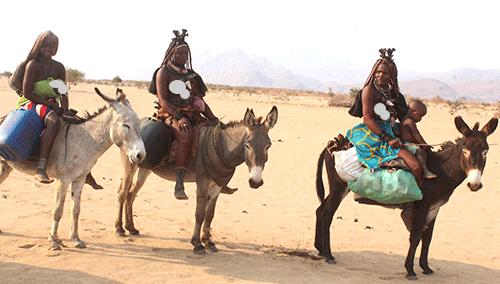In the rugged landscapes of Kunene, the humble donkey continues to play a pivotal role in the daily lives of many communities. Whether it is to fetch water, buy food or visit the hospital, donkeys help communities in areas where public transport is not freely available and expensive.
While donkey meat is enjoyed in certain cultures across Namibia, in some areas the humble ass plough fields as it is much cheaper than hiring a tractor, which many small-scale farmers cannot afford. The donkeys’ strength and endurance help farmers cut costs while ensuring that their fields are ready for planting.
However, in the Kunene region, donkeys are utilised to primarily carry heavy loads and travel long distances. These animals, patient and consistent, are crucial in an area where the roads are rough, and public transport is scarce.
These reliable low-maintenance vehicles are even used in political campaigns in that region.
Donkey politics
In a striking scene, Kazeongere Tjeundo, the former councillor of Opuwo Rural constituency, was spotted astride a donkey during a star rally for the Popular Democratic Movement (PDM) in Etanga village in the Epupa constituency.
The donkey, draped in party colours and posters, trotted through the streets as part of the convoy, adding a novel twist to door-to-door campaigning.
“We are here in Etanga, and our new strategy is to campaign with donkeys, going from house to house,” Tjeundo said, smiling from atop his makeshift ride.
“Our strategy is to connecting with people in their homes,” he said, as he moved from place to place, reaching voters.
For many others, the donkey is a necessary part of daily survival.
Uetuungurisa Matiti, a resident of Omuhoro village, was seen travelling with a donkey carrying a 50kg bag of maize meal.
“I live 10 kilometres away from the nearest shop. There’s no other transport here, and when it’s available, it’s too expensive. That’s why we depend on donkeys,” he said while his donkey walked slowly under the weight of the load.
Another resident, Katjoo Ngombe, uses her donkey to fetch water. Ngombe, who lives in Okapare village, about 190 kilometres outside of Opuwo, has always relied on donkeys for tasks like getting water and food.
She recalls how her family would use donkeys to transport them to hospital, and to collect firewood.
On the day we met her, she had already travelled five kilometres, and still had some distance to go before reaching her destination.
“This is the only transport we have known since we were children,” she said.
Further down the road, we found Uaziropi Hembinda, using her animal to carry containers of water from the boreholes back to her home.
“I can carry more water this way. The distance is far, and the donkey helps me transport the heavy containers,” she shared, leading her donkey along the dusty trail.
Butchery
In Omaheke’s regional capital Gobabis, located in the eastern part of Namibia, there was once a thriving business focused on donkey meat.
A local butchery specialised in selling donkey sausages, steaks, and mince to customers mainly from Epukiro and Windhoek. Despite its popularity, the butchery had to close in 2007 due to health regulations. The owner, Rynier van der Watt, claimed that overly-strict officials forced him out of business. At its peak, he was making about N$1 200 daily from selling donkey products, which were affordable at N$10 per kilogram, a price significantly lower than the N$30 charged for beef sausages.
In 2016, a local company, Agrinature, announced plans to open a donkey meat abattoir in Okahandja. However, the project faced strong opposition from some cultural groups, particularly the Damara community, who argued that the abattoir would not succeed because of the cultural importance of donkeys in Namibia. These groups work to preserve the traditions of Namibia’s diverse sub-clans and see the killing of donkeys for meat as unacceptable.
Delicacy
Down south in //Karas region lies Keetmanshoop’s Tseiblaagte location, where donkeys serve a very different purpose. Here, donkey meat is considered a delicacy, with locals affectionately calling it “//Khoa xa a donkey//gan i ge,” which means “donkey meat is tasty” in the Damara/Nama language.
In this community, the practice of eating donkey meat carries deep cultural meaning, and it is widely enjoyed, unlike in other parts of the country where it may be frowned upon.
This practice was highlighted in a New Era article published in 2013, showing how differently donkeys are valued across Namibia. While some communities see donkeys as helpers in everyday life, others value them as a special dish to be shared among family and friends. –ljason@nepc.com.na


